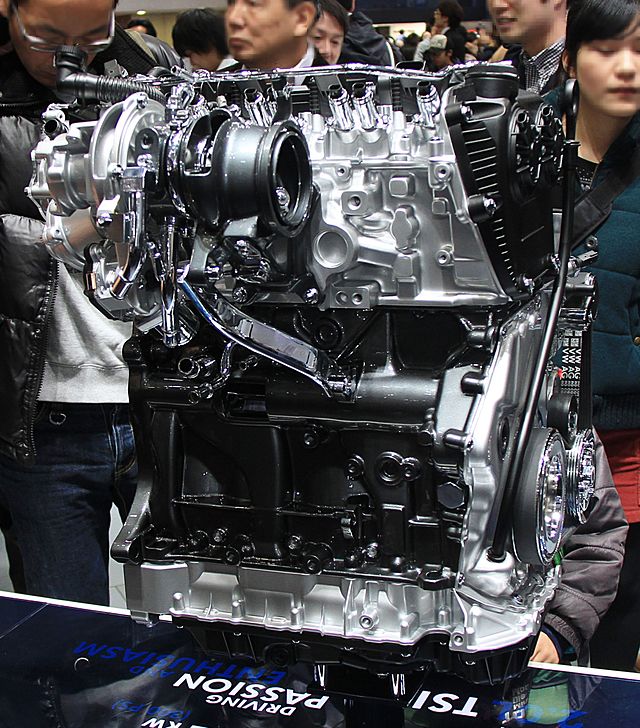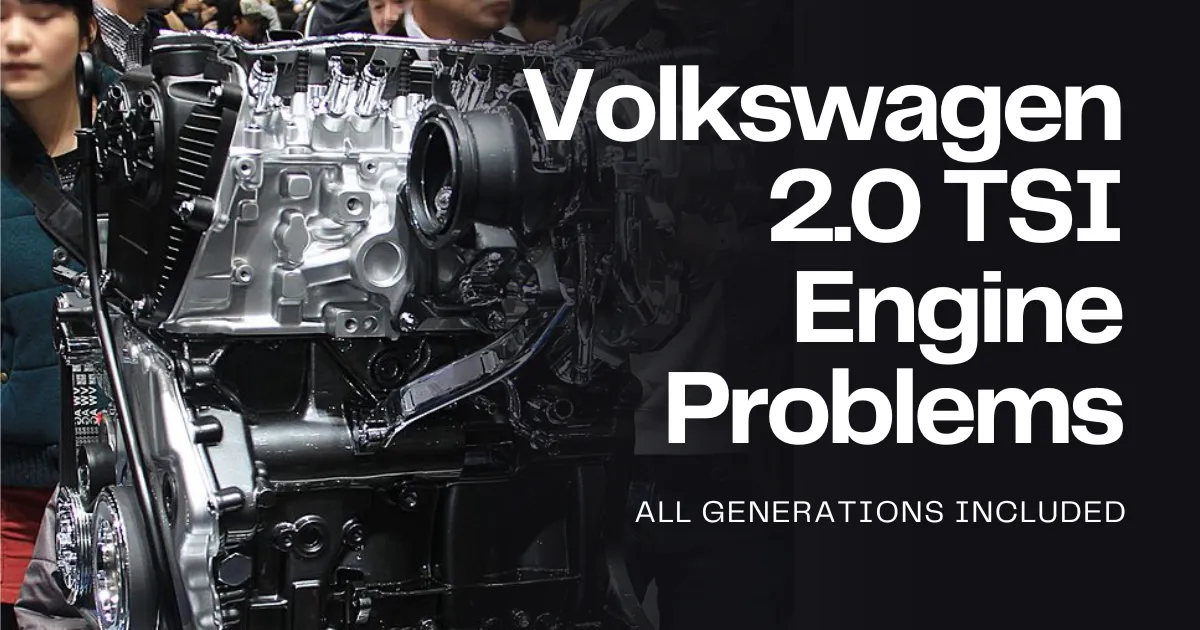Are you in the market for a Volkswagen with the 2.0 TSI engine and you want to learn more about the Volkswagen 2.0 TSI engine problems? If that is the case, you are at the right place because, in this article, there will be a lot to cover on this engine and its issues.
Doing your own homework when it comes to finding out the possible problems with a certain engine or vehicle is mandatory before you purchase it. You just don’t want to leave things to chance and hope for the best.

Vauxford, 2017 Volkswagen Golf GTi TSi 2.0 Front, CC BY-SA 4.0
You need to learn more about the possible problems because these problems can sometimes cost thousands of dollars to get sorted out. And honestly, the 2.0 TSI has more than a few of them. This is why we are here to help you out and pinpoint these issues for you, so you don’t have to deal with them.
First, we are going to cover the basic specs of this engine and then we will jump in straight to the Volkswagen 2.0 TSI engine problems and reliability. So, if you want to learn more about the possible problems with this engine, follow along!
Background Of The Volkswagen 2.0 TSI Engine
The 2.0 TSI engine is an engine that was introduced in 2008 and was produced until 2015. This engine preceded the current TFSI generation of the same engine.
To make things much simpler, it is worth noting that there was one TSI engine generation and two TFSI generations that followed with the 2.0 engine.
Both of these engine designs are turbocharged. But the TFSI included 9 more modifications in order to make the engine much more reliable that the original TSI engine that we are interested in this article.

Vauxford, 2018 Volkswagen Arteon R-Line TSi S-A 2.0 Front, CC BY-SA 4.0
Nevertheless, the TSI engine was the original first take by the VW group to create a turbocharged inline-4 engine. They already knew how to turbocharge diesel engines and deliver very reliable engines.
But this was their first try to do the same thing in a gas-powered engine and this understandably wasn’t without flaws. But more on the flaws we are going to discuss later on when we are going to cover the problems with these engines.
Basic Volkswagen 2.0 TSI Engine Specs
When it comes to the specs of the 2.0 TSI engine, we can say that this is an inline-4 engine that has a cast iron block with an aluminum head.
The engine comes with a double overhead valve design with four valves per cylinder. The engine features direct injection.
For the later models, they revised this design and implemented multi-point injection along the direct injection in order to tackle the problem of carbon buildup.
And most importantly, this first generation engine features a turbocharger that is water-cooled and incorporated into the exhaust manifold.
With this turbocharger, VW was able to tune this engine differently for each application. In other words to boost the engine at different PSI to get the performance desired for that specific application.

This allows these engines to be really tuner friendly and with only a Stage 1 tune, you can push them to great lengths.
That is something that you cannot do with a regular naturally aspirated engine. And with Stage 2 or Stage 3 engine upgrades, these engines can produce some serious power.
When it comes to power numbers, the least powerful version of this engine creates 124 kW (168 hp) @ 4,300 rpm and 280 N-m (207 lb-ft) @ 1,700 rpm.
The most powerful version creates 155 kW (208hp) @ 5,300 rpm and 280 N-m (207 lb-ft) @ 1,700 rpm.
Just to note that we are discussing the first-gen models here that don’t implement valve lift. EA888 evo2 and EA888 Gen3 are the upgraded versions of this engine that are branded as TFSI that were produced after 2015 and these engines are far more powerful and somewhat less problematic compared to the original TSI engine. More on the problems with the original TSI, we are going to discuss next.
Common Volkswagen 2.0 TSI Engine Problems
Now let’s briefly list the most common Volkswagen 2.0 TSI engine problems and see what it troubles the most.
Common Volkswagen 2.0 TSI engine problems include:
- Intake Manifold Failures
- Stretched Timing Chain
- Timing Chain Tensioner Failure
- High Oil Consumption
- Carbon Buildup
- Fuel Injector Failures
- PCV Valve Failures
- EVAP Purge Valve Failures
- Coolant Temperature Sensor Failure
- Spark Plug & Coil Failures
- HPFP Failures
- Boost Diverter Failures
- Water Pump Failures
Let’s now further elaborate on these problems and learn when and how they develop in these 2.0 TSI engines.
Intake Manifold Failures
Intake manifold failures are common in these engines. The intake manifold of this engine is notorious for failing and triggering the check engine light and also fault codes. In this case, it is the P02015 code. But there can be all sorts of other codes in the process because when this happens you most often have a vacuum leak.
On this specific intake manifold, there is an arm that moves in and out that can fail. As well as the solenoid failures, sometimes even the sensor on the other side of the manifold can fail.
Overall, a pretty annoying problem to deal with. Unfortunately, whenever something fails, you will have to buy a completely new intake manifold since these parts are not replaceable. This could be a costly thing to do.
Stretched Timing Chain
Timing chain stretching is a common problem on these engines as well. The timing chain should last a decent amount of miles but it can stretch.
When the timing chain stretches, there will be slack development and this slack will make the engine run pretty poorly.
There will be rattling noises coming from the engine, especially at lower RPMs. There could also be the check engine light and trouble codes.
In addition to this, this problem can also total out your engine completely. This is because if there is too much slack, the chain could jump and cause major engine damage. The pistons and valves will collide and the engine will be either due for a rebuild or scrap metal depending on the damage that was inflicted.
This is why you should always make sure that you handle these rattling noises coming from the engine with great care since this is a big problem with this specific engine.
Timing Chain Tensioner Failure
Next on our list of Volkswagen 2.0 TSI engine problems is the timing chain tensioner failure. The timing chain tensioner or the guide can fail and cause major engine damage.
The tensioner as its name implies is the component that keeps the tension on the timing chain. When this problem happens, you will get pretty much the same symptoms that you get when you have a stretched chain.
These symptoms will include rattling noises, check engine light, and overall poor engine work. The way to determine whether it is a timing chain stretch or timing chain tensioner failure is to remove the timing cover and inspect the damage.
In both situations, you will have to replace the chain, the tensioner, the guides, as well as the sprocket. This is an expensive problem to fix but it has to be done if you want to avoid engine damage.
High Oil Consumption
The next problem that this engine has is oil consumption, these first-generation TSI engines simply tend to drink more oil compared to the newer Gen3 design.
Some people attribute this oil consumption problem to the faulty PCV valve that often occurs and we are going to cover this in a bit.
Some owners are simply reporting that they fixed this problem by adding some thicker oil like 5w40.
While some owners reportedly solved this problem by updating the ECU of the car. Either way, this is an annoying problem and if you are not aware of the issue, you could leave the engine to starve from oil and end up being completely totaled.
So, if you own one of these engines, we would recommend that you check the engine oil regularly and top off the oil if needed. Now let’s move to the next Volkswagen 2.0 TSI engine problems.
Carbon Buildup
Carbon buildup on these engines is a very serious issue. So serious that it could even total out your engine. There are carbon deposits that occur in the engine. Namely, on the intake valves of the cylinder head.
The valve stems collect a lot of carbon deposits and this carbon is hard as a rock. It can prevent the valves from opening and closing correctly and you will experience cylinder head failure. This is the case because the engine uses direct injection.
This new way of injecting fuel does not clean the intake ports as older port injection designs did. This is why newer engines from this model, namely the TFSI engine, have dual fuel injection, both MPI and direct injection.
Symptoms associated with this problem are the check engine light, engine misfires, rough engine work, and poor fuel economy.
The only way to somewhat prevent this problem is to do walnut blasting every 60,000 miles or so. It might be somewhat expensive but it is worth it.
Fuel Injector Failures
Fuel injectors are another area where these engines have issues. This model uses direct injection and which means that the engine requires a different type of injectors. In other words, these engines are using something known as high-pressure fuel injectors.
These engines spray the fuel at extremely high pressure and almost atomize the gasoline. This improves efficiency.
But the injectors tend to fail often on these engines and replacing them can be somewhat more expensive compared to old-school injectors. They can be clogged up, or they can leak.
Both situations are not good and could trigger some symptoms like a check engine light, misfires, and rough engine work. Now let’s move to the next Volkswagen 2.0 TSI engine problems.
PCV Valve Failures
PCV valve failures are also very common in these engines. So, what is a PCV valve? Well, the PCV valve is really important in the positive crankcase ventilation system.
While the engine works, a lot of fumes are created, and these fumes have to go somewhere, if not some of the gaskets of the engine can fail.
And this is where the purge valve comes into play, it purges the gasses into the intake manifold in order to relieve some of the pressure and these fumes to burn.
Sometimes this valve can fail and cause problems like oil leaks from the side of the engine and also problems like oil consumption that we mentioned previously. This is why it is recommended to add an oil catch can if your engine consumes oil because of this valve. And if the valve fails, you should not wait and replace it immediately.
EVAP Purge Valve Failures
EVAP purge valve solenoid failures were also reported on this engine. But what is an EVAP purge solenoid?
Well the EVAP system is an emissions system. In simple words, this system collects the fumes that evaporate in the fuel tank and redirects them into the intake manifold.
Whenever there is enough pressure buildup in the system, the purge valve will activate and release these gasses into the intake manifold. In other words, it will purge the gasses.
These solenoids are basically electronic switches and they can fail. Whenever they fail you will get the check engine light and a P0443 or a similar code. The only way around this problem will be to replace this purge valve solenoid with a new one.
Coolant Temperature Sensor Failure
The coolant temperature sensor is also notorious for failing on these engines. So, what is the coolant temperature sensor?
This sensor is also known as an ECT sensor. It has the simple task of monitoring the coolant temperature and helping the engine work properly.
At cold start, this sensor records the temperature and tells the engine that the coolant is cold. So, the engine knows how to adjust the air-to-fuel ratio and make the A/F ratio richer. Then as the temperatures rise, the computer will know how to make the A/F ratio leaner with the help of this sensor.
This sensor also activates the fan of the radiator. So, we can say that it is really important. If you have problems with this sensor, you will get a check engine light and the car will run constantly lean or rich. It will have trouble starting and have many other issues. This is why replacing this sensor is really important. Now let’s move to the next Volkswagen 2.0 TSI engine problems.
Spark Plug & Coil Failures
Spark plugs and ignition coils are also common causes of headaches on these TSI engines. These components can fail all of a sudden and cause engine running issues.
There is a high chance that you will have to replace them at least once during your ownership of the vehicle.
Common symptoms associated with these failures are check engine light, engine misfires, rough idle, poor performance, poor fuel economy, and also a limp mode in more extreme cases.
Luckily, they are not extremely expensive to replace and you can do this job at home and save some money in the process.
HPFP Failures
Another common problem in our list of Volkswagen 2.0 TSI engine problems is the high-pressure fuel pump failure. So, what is an HPFP?
This vehicle is using something that is known as direct injection. Direct injection is a system that requires a secondary fuel pump besides the one found in the gas tank. The pump in the gas tank is low-pressure, while the one in the engine bay is high-pressure.
These high-pressure pumps are notorious for failing and causing problems. They can stop working and you will be left with no fuel.
In this case, the car might crank and not be able to start. Luckily, these HPFP pumps are located on top of the engine, and replacing one of these pumps is really easy to do. They are also not that expensive after all.
Boost Diverter Failures
These engines have something known as a boost diverter, also known as a DV valve. In other words, this is a turbocharger recirculating valve that is attached to the turbo.
This valve has a diaphragm that is prone to tearing and when it tears, it can cause problems to appear. A very small pinhole will allow the boost to spike, while bigger tears will cause the car to lose boost and not be able to deliver the power needed.
In this case, you will get a check engine light and trouble codes like the P0299. The solution is to remove the component and inspect the diaphragm. If the diaphragm is torn, you should replace the DV valve. Luckily, it isn’t that expensive to get this problem sorted out.
Water Pump Failures
And last but not least on our list of Volkswagen 2.0 TSI engine problems is the problem with water pump failures.
Water pumps tend to fail on these engines more frequently compared to others. So, if you notice some strange noises coming from the water pump or possibly leaks, you know that this component is due to be replaced. If you don’t replace the water pump on time, the engine would overheat and engine damage can occur.

Vauxford, 2021 Volkswagen Golf R TSi 4MOTION 2.0, CC BY-SA 4.0
Volkswagen 2.0 TSI Reliability
The overall reliability of this engine is somewhat mediocre. We wish VW did better with this engine. But this engine was one of their first takes on creating gas-powered turbo engines.
So, this 2.0 TSI engine carries a lot more problems compared to the newer ones. This is why we would recommend that you get a newer model year after 2015. These engines had many of these issues sorted out and are no longer a problem.
Which Models Have The 2.0 TSI Engine?
Now let’s take a look at which models this 2.0 TSI engine was included in. These are cars produced between 2008 and 2015. After 2015 the second revised generation of this engine was introduced in the market.
- VW Tiguan 2009 – 2015
- VW Golf MK5 2008 – 2009
- VW Golf MK6 2010 – 2014
- VW Jetta MK5 2008 – 2009
- VW Jetta MK6 2010 – 2014
- VW Passat B6 2008 – 2010
- VW CC 2009 – 2015
- VW Beetle 2012 – 2015
- VW EOS 2008 – 2014
- Audi A3 2008 – 2014
- Audi TT MK2 2008 – 2014
Conclusion
In this article, we have covered quite a bit when it comes to the Volkswagen 2.0 TSI engine problems. First, we learned more about the background and the specs of this engine.
Then, we focused on the common problems that this engine has and honestly, there are more than a few things wrong with this specific engine. Lastly, we discussed the reliability of the 2.0 TSI and the applications.
Overall, this engine is below average in terms of reliability. Your best bet would be to get a 2016 model year or newer engine that had been revised and most of the problems sorted out.
FAQ
What Are The Common Volkswagen 2.0 TSI Engine Problems?
There are a lot of problems that this engine has. Spark plugs and coils often fail, water pump failures are common, carbon buildup on the intake ports, timing chain tensioner failure and timing chain stretching can occur, HPFP failure, PCV valve failure, boost diverter valve failure, and fuel injector failures. Overall, these are the most common problems with this first-generation 2.0 TSI engine.
Is Volkswagen 2.0 TSI Engine Reliable?
This engine has dubious reliability. It has a lot of components that often fail and overall, it does not have a good rep in the car community. Especially issues with the timing chain and carbon development on the intake valves. If you don’t address these problems, the engine could be easily totaled out. Whenever you have an engine like this, you need to be aware of its faults and make sure that you address the problems accordingly before they ruin the engine.

